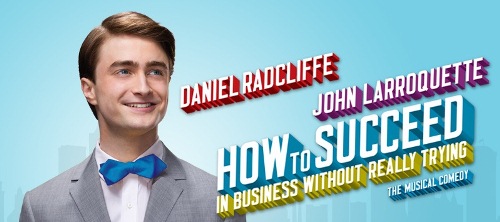The original 1961 Broadway production opened to highly positive reviews. New York Times critic Howard Taubman wrote, "It stings mischievously and laughs uproariously...It belongs to the blue chips among modern musicals". Taubman praised the show's "adult viewpoint and consistency of style", stating that Burrows had "directed brilliantly" and that Loesser had "written lyrics with an edge and tunes with a grin...the songs sharpen the ridicule". Taubman stated Robert Morse played Finch "with unfailing bravura and wit", pronouncing Finch, as portrayed by Morse, "a rumpled, dimpled angel with a streak of Lucifer".
John Chapman of the Daily News deemed it "the definitive musical about high life in the city" with "perfect musical comedy construction". Chapman declared that "Loesser is the perfect man for his end of the show - the songs; for he is a cynic without being tough. He has not put in a note of music or a syllable of lyric that doesn't carry the story along."
Richard Watts, Jr. of the New York Post wrote, "In its first performance at the 46th St. Theater Saturday night, its satire, humor, book, music, lyrics, cast, staging, choreography, setting and general gaiety of spirit combined in a smooth, fast pattern of expert showmanship to make the occasion a delightful event."
In the New York Herald Tribune, critic Walter Kerr stated, "Not a sincere line is spoken in the new Abe Burrows-Frank Loesser musical, and what a relief that is...How to Succeed is crafty, conniving, sneaky, cynical, irreverent, impertinent, sly, malicious, and lovely, just lovely". He opined that Burrows was most responsible for the musical's success, pronouncing, "What most distinguishes a sassy, gay, and exhilarating evening is--you'll never believe this--the book...Gags are subordinated to impish running commentary; Mr Loesser's perky score is subordinated to the merry malice that is afoot". John McClain of the New York Journal American declared it to be "The most inventive and stylized and altogether infectious new musical in recent recollection", pronouncing it "the sheerest farce..gay, zingy, amoral, witty and shot with style. It comes very close to being a new form in musicals". He praised Loesser's score, saying, "All the music has been integrated into the plot, to fit the mood as well as the momentum. His lyrics are generally superb". McClain particularly noted Bob Fosse's choreography, saying that his dances were "a whole new chapter in ingenuity".[24] Norman Nadel of the New York World-Telegram and Sun declared, "Whichever white winged angel watches over theatrical enterprises was sitting on top of the 46th St. Theatre Saturday night, joyously blasting away on a solid gold trumpet".
In contrast, in their reviews of the 2011 Broadway revival, the New York Times chief theater critic Ben Brantley warns that the show’s book writers "failed to give Ponty any defining traits beyond all-consuming ambition" and that "you don’t particularly want [Daniel Radcliffe's] character in the show to succeed, and that really is a problem.", while Charles McNulty of the Los Angeles Times opined that the musical "is hampered by a dated book" and that its "episodic structure now seems as belabored as a sitcom plucked from a rusty time capsule", while "all the romantic brouhaha with moony secretaries is beyond retro."

.png)
.png)





